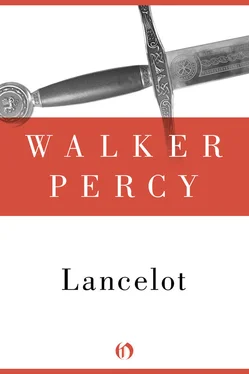Freedom’s just another word. Lord, for nothing left to lose
Nothing ain’t worth nothing, Lord, but it’s free
Feeling good was easy, Lord, when Bobby sang the blues
Feeling good was good enough for me
Good enough for me and Bobby McGee.
Bobby McGee got away, but she wasn’t getting away from me. I didn’t want freedom, I wanted her beside me on the grass, the sun making copper lights on her coarse springy hair, her miraculous gold skin glowing with a sunlight all its own. Pass the bottle, pass the Seven-Up, kiss her sweet lips, lie with her, both of us dry-sweated from different sweats, mine law-office seersucker Blackstone calfskin sweat, hers the clean bathed housewife’s morning sweat. Kissing her mouth was kissing the day itself, the October sunlight and whiskey and Seven-Up on her lips and she herself in her mouth, her woman’s inside taste yet hers alone too, the special odd astringent chemistry of Mary Margaret Reilly’s own saliva.
Love her? I’m not sure what words mean any more, but I loved her if loving her is wanting her all the time, wanting even the sight of her, and being away from her was like being short of breath, and seeing her, just catching sight of her at a distance, was a homecoming to a happy home and a rising of heart. Once I even laughed and clapped my hands when I turned into Belle Isle and saw her on the gallery. I felt like my ancestor Clayton Laughlin Lamar coming home from Virginia in 1865.
Lucy I loved too, but Lucy was a dream, a slim brown dancer in a bell jar spinning round and round in the “Limelight” music of old gone Carolina long ago. Margot was life itself as if all Louisiana, its fecund oil-rich dark greens and haunted twilights, its very fakery and money-loving and comicalness, had all been gathered and fleshed out in one creature. It meant having her and not being haunted, holding all of goldgreen Louisiana in my arms. She was a big girl.
Later we lived by sexual delights and the triumphs of architectural restoration. Truthfully, at that time I don’t know which she enjoyed more, a good piece in Henry Clay’s bed or Henry Clay’s bed. Once a couple of years ago when we were making love, I saw her arm stretch back in a way she had, but now not to grab the bedpost as a point of anchorage or leverage in the storm-tossed sea of love, to hold on for dear life — no, not at all: this time as her arm stretched up her fingers explored the fine oiled restored texture of the mahogany, her nails traced the delicate fluting of the heavy columns.
Later than that, when I took to the bottle — a different love story — and became a poor lover, once again inattentive and haunted, she came to prefer restoration to love. Certain architectural triumphs became for her like orgasms, like the time she dug up a ninety-year-old plaster craftsman in Bunkie, Louisiana, when everybody had told her they had all died, she having discovered old accurate sketches of the plaster roses in the ceilings of the burned wing of Belle Isle. Her face glowed: bringing together the two, the sketches and the long-lost craftsman, and seeing the great shallow roses take form was, I saw, as good for her as sexual love, at the time better in fact.
Then what happened between me and Margot?
If she was here, I know what she’d say and she’d be right as far as she went: Instead of loving me, you crawled into a bottle and I just decided I’d be damned if I’d crawl in with you. You made your decision.
But she’d also be partly wrong. The simple and amazing truth is that when she finished fixing up Belle Isle, she also somehow finished with me. The house Belle Isle was she herself, a Louisiana belle, and when she had done it over and done herself over just right and had finished with me, a proper Louisiana gent — after she had done us both, she was through with both. Once she’d done every conceivable bit of restoration, poring over old sketches, enlisting historians, importing Carrara marble carvers — once she was finished, we were finished — the only important thing for her was that everything had to be exactly as it was. Why? I asked her once. Why does everything have to be exactly as it was? She did me over too. She didn’t restore me exactly, she created me according to some Texas-conceived image of the River Road gentry, a kind of gentleman planter without plantation, a composite, I came to understand, of Ashley Wilkes (himself a creature of another woman of course, an anemic poetic Georgia gent), Leslie Howard (another anemic poetic gent), plus Jeff Davis home from the wars and set up in style by another strong-minded woman at Beauvoir, parked out in a pigeonnier much like mine, plus Gregory Peck, gentle Southern lawyer, plus a bit of Clark Gable as Rhett. She even bought my clothes. She liked me to wear linen suits.
I went along agreeably, amused by her extraordinary Texas notion that we “aristocratic” folk were somehow all of a piece. Of course we were not, not even aristocratic, and since I never felt much of a piece myself, I’d as soon dress the part. I even found myself playing up to the role, pacing up and down, stopping now and then to make a legal note at my plantation desk in her Florentine-leather notepad, stopping at the cypress cupboard-turned-into-bar to pour a whiskey from crystal decanter into silver jigger, the way Southern gents do in the movies.
Did you know that the South and for all I know the entire U.S.A. is full of demonic women who, driven by as yet unnamed furies, are desperately restoring and preserving places, buildings? Women married to fond indulgent easygoing somewhat lapsed men like me, who would as soon do one thing as another as long as they can go fishing, hunting, drink a bit, horse around, watch the Dolphins and Jack Nicklaus on TV. So here’s this fellow like me who maybe had a moment of glory in his youth, in football, in Phi Beta Kappa, as Grand Dragon of his fraternity, and now is managing Auto-Lec or Quik-Stop and every night comes home to a museum such as not even George Washington slept in.
So she finished the house and we found ourselves at a loss. What to do? We did what other well-off thirty-five-year-old couples did: went skiing in Aspen, house-partying, fishing and drinking on the Gulf Coast, house-partying and drinking in Highlands.
But what to do then? What to do with time? Make love. Have a child. We did that. At least I thought we did that. But after she finished Belle Isle and named her child Siobhan, there was nothing to do. Siobhan was well looked after, especially when granddaddy Tex moved in with us.
I could see her problem. Christ, what was she going to do? What to do with that Texas energy and her passion for making things either over or of a piece. What did God do after he finished creation? Christ, she didn’t know how to rest. At least in Louisiana we knew how to take things easy. We could always drink.
That was when she revived her interest in the “performing arts” and went to Dallas-Arlington to study under Merlin.
Did I love her? Why are you always asking about love? Have you been crossed up too? Isn’t your God’s love enough for you? Margot’s love was enough for me. I loved her sexually in such a way that I could not not touch her. My happiness was being with her. My old saturninity vanished. I hugged and kissed her in the street, necked in the car like white trash in the daytime, felt her up under the table in restaurants, and laughed like a boy to see her blush and knock my hand away and, looking anxiously around, revert to her old Texasese: “Git away from here! What you think you doing, boy!”
There is no joy on this earth like falling in love with a woman and managing at the same time the trick of keeping just enough perspective to see her fall in love too, to see her begin to see you in a different way, to see her color change, eyes soften, her hand of itself reach for you. Your saints say, Yes but the love of God is even better, but Jesus how could this be so? Well? Your eyes go distant as if you were thinking of a time long ago. Does that mean that you are no longer a believer or that nowadays not even believers can understand such things? Doesn’t your own Jewish Bible say there is nothing under the sun like the way of a man with a maid?
Читать дальше












